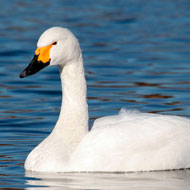
Population down by more than a third between 1995 and 2010
Bewick's swans - the UK's smallest and rarest swan - have suffered an alarming crash in numbers according to new figures released by the Wildfowl & Wetlands Trust.
More than a third of Bewick's swans that winter in Europe have disappeared since 1995, when the population peaked at 29,000, with latest figures showing by 2010 there were just 18,000 left.
Scientists from the Wildfowl & Wetlands Trust (WWT) say they fear the next census, due this winter, will reveal a further decline.
The Trust started studying the swans 50 years ago when naturalist and artist Sir Peter Scott first recorded the facial markings of the birds at the WWT's Slimbridge headquarters. Since then the research has been expanded to link up with teams along the swans' migration routes across northern Europe and Russia and, working together, international protection has been secured for a chain of wetlands that are vital for feeding and rest for the swans.
WWT Head of UK Waterbird Conservation Eileen Rees said that despite this the swan population had gone into decline.
"At this time each year the Bewick’s swan flocks start to return to the UK’s wetlands from their arctic breeding grounds. But recently they have been returning with too few young, and the numbers indicate that they aren’t producing enough offspring to replace all the swans that have died over the year. We have two possible solutions: to find out and address what’s hampering breeding, and to reduce the number of preventable deaths along their migration route. We have a plan in place to do both, and much work is underway already, but we need to do it all if we’re to change the fortune of our wildest and most beautiful swan."
WWT is currently raising money through its Hope for Swans appeal to deliver the Bewick's Swan International Action Plan, which aims to stabilise the population. The trust is the current chair of the Wetlands International/ International Union for Conservation of Nature Swan Specialist Group, which is tasked with investigating and addressing the reasons for the Bewick's swan's decline.
Work underway to tackle the threats facing the swans include talking to local communities along the migration routes to pinpoint hotspots for illegal shooting, working with electricity companies to deal with potential hazards such as power lines and offshore wind farms, monitoring population trends and analysing demographics to confirm the extent to which variation in survival and breeding success explains the population decline and any environmental reasons underlying the change.
Image: Wikipedia/Maga-chan/CC BY-SA 2.5



 The Veterinary Medicines Directorate (VMD) is inviting applications from veterinary students to attend a one-week extramural studies (EMS) placement in July 2026.
The Veterinary Medicines Directorate (VMD) is inviting applications from veterinary students to attend a one-week extramural studies (EMS) placement in July 2026.